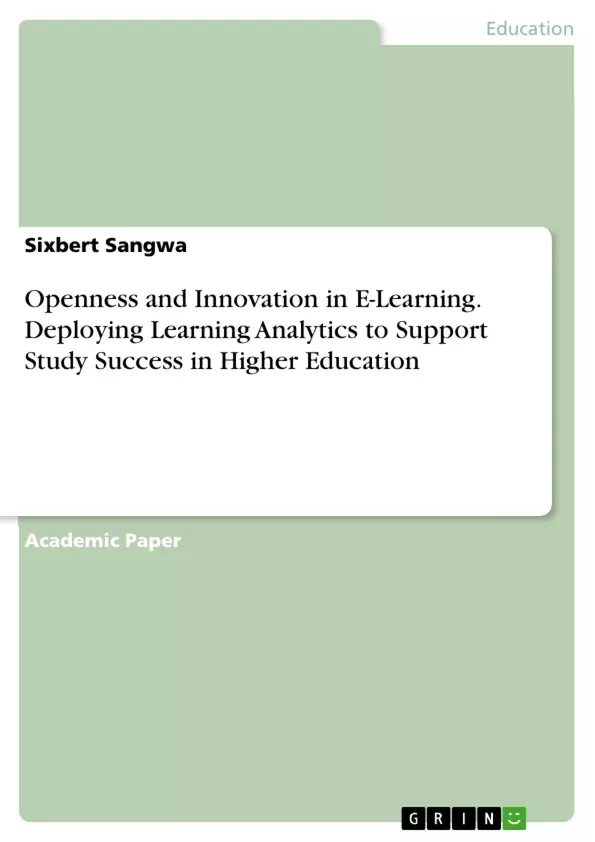This report presents, analyzes and critically discusses learning analytics on the extent to which it supports learning. It will introduce the learning analytics and provide its background to the current research and development in e-learning, explaining how they relate to, and differ from, other uses of data in education.
The report shall also describe in details the implications associated with the use of learning analytics in the context of international training organizations and the recommendable success load map. In the same context, a justification on how the most important features of learning analytics support learning will be provided, setting out the key benefits and risks. Finally, two examples illustrating the use of learning analytics will be evaluated against how they enhances learning in relevant contexts. As far as resourcing will be given account, the continuous use and innovation in learning analytics is recommended.
Inhaltsverzeichnis (Table of Contents)
- I. Introduction to Learning Analytics
- 1.1. Definition
- 1.2. Implications
- 1.2.1. Context
- 1.2.2. Implication
- II. Justification
- III. Evaluation
- 3.1. Save the children's onenet platform
- 3.2. Open University's VLE
Zielsetzung und Themenschwerpunkte (Objectives and Key Themes)
This report provides an analysis and critical discussion of learning analytics and its potential to support learning. It explores the definition and background of learning analytics within the context of current research and development in e-learning, comparing and contrasting it with other uses of data in education. The report then examines the implications of learning analytics in international training organizations, recommending a success roadmap. It also justifies the key benefits and risks of learning analytics and evaluates two specific examples of how it enhances learning in relevant contexts. The report concludes by recommending the continued use and innovation of learning analytics for optimal outcomes.
- Learning Analytics (LA) and its role in supporting student learning and enhancing learning experience
- The implications of using LA in educational and training organizations, particularly in the context of international child-focused organizations
- The benefits and risks associated with the adoption of LA in education
- Evaluation of real-world examples of LA implementation to illustrate its impact on learning
- The recommendation for continued use and innovation of LA in educational settings
Zusammenfassung der Kapitel (Chapter Summaries)
- I. Introduction to Learning Analytics:
- This chapter defines learning analytics and examines its relationship to other data-driven approaches in education.
- It explores the origins of learning analytics and its growing importance in online learning environments.
- The chapter also discusses the different types of data that are commonly collected and analyzed in learning analytics, including learners' personal traits, competence traits, and behavioral patterns.
- II. Justification:
- This chapter presents a justification for the use of learning analytics in educational settings.
- It focuses on the key benefits and risks of using LA, considering its potential to improve learning outcomes and address specific challenges in education.
- III. Evaluation:
- This chapter explores two specific examples of learning analytics implementation.
- The examples illustrate how LA can be used to enhance learning in different contexts, highlighting the potential for personalized learning and improved student engagement.
Schlüsselwörter (Keywords)
The core keywords and focus topics of this report are learning analytics, virtual learning environment (VLE), learning management system (LMS), student behavior in online environments, online education, and student retention. The report investigates the use of learning analytics to understand and optimize student learning in various contexts, emphasizing its role in enhancing engagement, improving outcomes, and supporting the overall success of online learners.
- Citation du texte
- Dr. Sixbert Sangwa (Auteur), 2019, Openness and Innovation in E-Learning. Deploying Learning Analytics to Support Study Success in Higher Education, Munich, GRIN Verlag, https://www.grin.com/document/1012814



